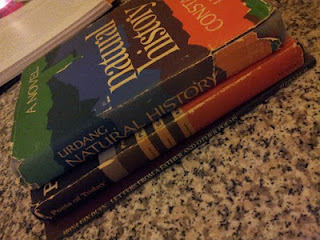Yikes! So here it is -- the end of November. And let me just say .... I am feeling pretty good dissertation-wise! Perhaps I have finally hit my stride because I am spending huge amounts of time (when I am not teaching or grading) working on Chapters 5 and 6. And the best part is that what I am coming up with is at least okay (as far as I can tell!). This week I pretty much focused in finishing up the Analysis (Chapter 5). I have a few more small things to insert but I think that section is now pretty much done -- for now (because I am sure there will be some editing and changes that will be happening after that fabulous Dr M takes a look!).
If you all remember, pre-Thanksgiving Break I tried to think about these last two big sections as two 20 page papers (making this task not seem so impossible since I have written several 20 page papers in my academic life on many occasions, especially near the end of a semester!). And maybe that was just the bee in my butt that I needed! Right now, the analysis chapter is sitting at about 25-26 pages and the last chapter (the conclusion!) is at about 22. I have so far just been "dumping" mini-discussions into my conclusion and I haven't had the chance to shape and mold it too much yet (the fun I am saving for this weekend and all of next week!). So -- the point in telling you all this?! I am not worried about page numbers at this point -- right now, I just want to make sure that I have something interesting (dare I say "intellectual"?) to share with the folks in my field.
My deadline to complete the basic chapters is December 21 and I think I should make that (though the superstitious part of me is knocking on wood as I say this!). I am hoping, then, that I can finish a little bit early and join my friend Peggy for a short holiday in Chicago around the 17 or 18th of December with total relaxation in mind -- before I came back to the dissertation in January, make any needed big changes, defend (maybe in Feb or March?), and then graduate! (in May?). I haven't been thinking about this stuff too much before now because I haven't wanted to jinx anything -- and maybe I am jinxing things a little but it is so nice to see a little light at the end of the tunnel -- finally!


